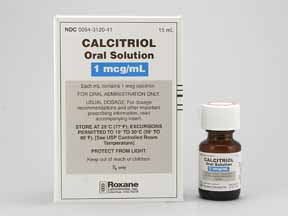Calcitriol is a synthetic form of vitamin D often prescribed to individuals who cannot produce enough active vitamin D due to kidney disease. It is particularly beneficial for patients undergoing long-term kidney dialysis or those with hypoparathyroidism, as it helps manage calcium, phosphorus, and parathyroid hormone levels. By elevating vitamin D levels, calcitriol enhances the body’s ability to absorb calcium, thus increasing blood calcium levels. Available as capsules or liquid, this medication is used to treat low calcium in dialysis patients, secondary hyperparathyroidism, and low calcium in those with hypoparathyroidism or pseudohypoparathyroidism. Calcitriol is typically used in conjunction with dietary recommendations and possibly other medications. Always consult healthcare professionals for personalized advice before using calcitriol.
Our coupons are free to use. Before paying, show the pharmacist your Calcitriol savings card to get your free discount. Use our filters below to edit the prescription box to match your needs. The Calcitriol prices will update based on your prescription needs. Above our Calcitriol coupons, you can change your location to see pharmacy prices and costs in other areas. We're here to help you buy Calcitriol at the lowest price with our prescription discount card.
My prescription
Edit
15ML of 1MCG/ML, Calcitriol (1 Bottle)
Select pharmacy

CVS
$73.33
COUPON PRICE
Walgreens
$55.94
COUPON PRICE
Walmart
$91.98
COUPON PRICE
Albertsons
$94.15
COUPON PRICECalcitriol savings card
Show this card to your pharmacist
Walgreens
$55.94
BIN
ID
PCN
GRP
011867
LHB1223CEA
HT
LABH001
Powered by
Calcitriol is a synthetic form of vitamin D often prescribed to individuals who cannot produce enough active vitamin D due to kidney disease. It is particularly beneficial for patients undergoing long-term kidney dialysis or those with hypoparathyroidism, as it helps manage calcium, phosphorus, and parathyroid hormone levels. By elevating vitamin D levels, calcitriol enhances the body’s ability to absorb calcium, thus increasing blood calcium levels. Available as capsules or liquid, this medication is used to treat low calcium in dialysis patients, secondary hyperparathyroidism, and low calcium in those with hypoparathyroidism or pseudohypoparathyroidism. Calcitriol is typically used in conjunction with dietary recommendations and possibly other medications. Always consult healthcare professionals for personalized advice before using calcitriol.
Our coupons are free to use. Before paying, show the pharmacist your Calcitriol savings card to get your free discount. Use our filters below to edit the prescription box to match your needs. The Calcitriol prices will update based on your prescription needs. Above our Calcitriol coupons, you can change your location to see pharmacy prices and costs in other areas. We're here to help you buy Calcitriol at the lowest price with our prescription discount card.
More prescriptions for psoriasis
coupons from$5.32Save 83%
coupons from$2.15Save 96%
coupons from$11.41Save 82%
coupons from$60.94Save 81%
coupons from$1.01Save 98%
coupons from$10.84Save 78%
coupons from$185.76Save 92%
coupons from$6.05Save 79%
More prescriptions for psoriasis
Methylprednisolone Save 83%coupons from $5.32
Decadron Save 96%coupons from $2.15
Ala-cort Save 82%coupons from $11.41
Diprolene Save 81%coupons from $60.94
Anthralin Save 98%coupons from $1.01
Procto-med Hc Save 78%coupons from $10.84
Nolix Save 92%coupons from $185.76
Triderm Save 79%coupons from $6.05
Calcitriol dosage forms
Use our Calcitriol 0.001GM coupon with prices from $636.81 for 1 Bottle. You can also use our Calcitriol 0.001GM coupon with prices from $1261.67 for 2 Bottles. We have a Calcitriol 0.001GM coupon with prices from $1883.35 for 3 Bottles. You can use our Calcitriol 15ML coupon with prices from $86.43 for 1 Bottle.
Dosage Quantity Price from Per unit 0.001GM 1 Bottle $636.81 $636.81 0.001GM 2 Bottles $1261.67 $630.84 0.001GM 3 Bottles $1883.35 $627.78 15ML 1 Bottle $86.43 $86.43 15ML 2 Bottles $154.56 $77.28 15ML 3 Bottles $230.69 $76.90
| Dosage | Quantity | Price from | Per unit |
|---|---|---|---|
| 0.001GM | 1 Bottle | $636.81 | $636.81 |
| 0.001GM | 2 Bottles | $1261.67 | $630.84 |
| 0.001GM | 3 Bottles | $1883.35 | $627.78 |
| 15ML | 1 Bottle | $86.43 | $86.43 |
| 15ML | 2 Bottles | $154.56 | $77.28 |
| 15ML | 3 Bottles | $230.69 | $76.90 |

